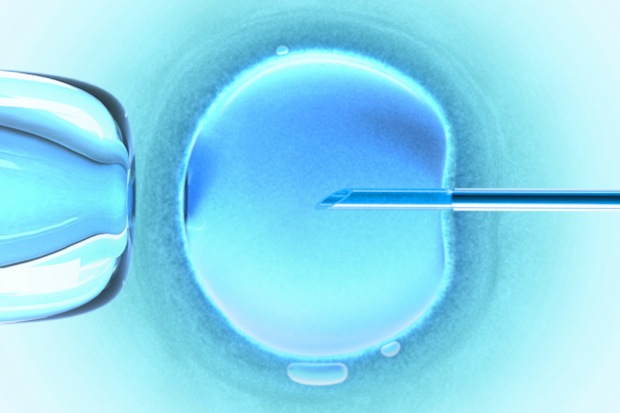Because I’d like to have a child, and I’m getting on a bit, my husband and I have spent time recently with consultants. They’re an odd breed with distinct and shared characteristics. Invariably, after we’ve all sat down, their first move is to tilt their chair back, or give it a little twirl (design permitting), just to signal how free and easy it is at the top of the medical tree. When they speak it’s with a sort of hurried condescension, as if giving career advice to a hopeless niece. And they scribble as they go, on some scrap of paper. Ovary, ovary, arrow, hieroglyph, arrow, ‘Got that? Hmmm?’ Follicle, scribble, circle, square.
It would be easy to sink into a happy torpor if it weren’t for the odd direct question, lobbed like an existential grenade into the room. ‘There is of course the risk of complications. Cretinism and so forth. What is your position in the case of cretinism?’
One minute your lids are drooping, the next you’re staring wildly at your life partner across an existential abyss. Darling? In the case of cretinism? Did we have a position?
Beneath the triangulated silence lies the uneasy truth: that we don’t quite agree about these things. So we say: yes absolutely, we’ve talked that through. And I thank God that we’re not doing all this in ten years’ time.
I’ve read a lot of bumf about breakthroughs in fertility recently, and I feel for the happy couples of the future and the moral issues they’ll face. On the one hand geneticists are pushing forward every day, deciphering the genes which give rise to human traits, good and bad: for blue eyes, for height, for alcoholism even. On the other hand, the screening of embryos is becoming ever easier. Preimplantation genetic screening, it’s called, or PGS: you fertilise a clutch of eggs, then carefully extract a single cell from each to see which genes what’s got. So there’s a scientific pincer moment going on. The more genes we ‘discover’ and the cheaper PGS becomes, the closer we come to that sci-fi day when parents can shop for their fantasy tot. Your grandchildren may be able to browse for genetic traits in their kids the way you choose shoes — and for me that’s where the trouble begins.
Let’s start with the sunny side of PGS. Earlier this month an American medical journal published a piece on the Kalinskys. Mrs Kalinsky carries the gene for Gerstmann-Straussler-Scheinker disease, or GSS, which invariably leads to an early and nasty death. She’s doomed to keel over about 50, and that’s a life no one would want for their child, so the Kalinskys did IVF and PGS. They screened their embryos, and selected the ones without the gene for GSS and they now have three healthy Kalinsky kids. Hooray for that.
But what about screening for a gene that just carries a risk of some disease? After all, that’s the way most genes operate. A fault in BRCA1 or BRCA2 is associated with a high risk of breast cancer. Is that a good enough reason to create embryos, select some, snuff some out? The argument is often put as if PGS saves a child from some nasty fate — but this is a moral sidestep. It’s great to have a girl who won’t get breast cancer, but anyone would prefer to be born with BRCA1 rather than not at all.
Now you might think — and rightly — that this is a battle already fought and lost. In a world with routine IVF and the morning after pill, let alone free and easy access to abortion, it makes no sense at all to get anxious about embryos. They form and fall away in their millions every day; they’re not sentient, they can’t feel pain. Maybe it’s no worse to snuff out an embryo than to squash a pea under a fork — but doesn’t something in you baulk at beginning lives just to discard them on a whim?
What about screening just for gender? Most doctors will refuse to abort a foetus because you want a different sex, but is it OK for embryos? What if it becomes routine for the rich to select blonde, leggy girls, or sons with the family chin? Don’t you feel in your bones that there should at least be some serious reason to make and break life — or it’s as if we’ve forgotten we were all embryos once.
My half-baked position, thought through mostly in waiting rooms, is that it’s a better fit with our instincts to assume that embryos do have some moral status, even if just a shadow of one; enough so we can accept it’s at least a sadness to snuff ’em out. You could think of it as a measure of their potential or a respect for human life; or as a corollary of the happiness you feel when a friend says she’s pregnant, which is not just because you’re pleased for her — but because you’re pleased about existence of the thing in itself.
If it still makes no sense to you to get sentimental about bundles of fizzing cells, how do you feel about parents selecting for embryos with a high IQ? Just this month scientists at King’s College have found that teenagers who had a highly functioning NPTN gene performed better in intelligence tests. This particular gene only accounts for a mere 0.5 per cent of the variance in IQ, but even so — think how far some parents will go to give their kid the slightest edge. There’s a team including the Chinese company BGI and the superstar geneticist Robert Plomin busy searching for the hundreds or thousands of genes responsible for IQ. They think they will succeed within a decade, and do you really think the Chinese will have scruples about designing a master race?
And what about homosexuality? Just as we reach the rainbow-lit uplands above prejudice, so we have to deal with this year’s exciting fact that gay men often share a similar genetic make-up. What, oh pragmatists, will you do if couples start screening for ‘gay’ genes and discarding embryos which carry them? What if couples try to select gay children? On what grounds will you intervene?
Worldwide, different countries have utterly different approaches, from anything goes in the States to the Swiss and their blanket ban on PGS. It’s a measure of just how tricky the whole business is. Perhaps it’ll be some consolation for those poor couples of the future to think that no position makes perfect sense, everyone’s feeling their way.
Got something to add? Join the discussion and comment below.
Get 10 issues for just $10
Subscribe to The Spectator Australia today for the next 10 magazine issues, plus full online access, for just $10.
You might disagree with half of it, but you’ll enjoy reading all of it. Try your first month for free, then just $2 a week for the remainder of your first year.















Comments
Don't miss out
Join the conversation with other Spectator Australia readers. Subscribe to leave a comment.
SUBSCRIBEAlready a subscriber? Log in